Topic: Department of Agriculture, Division of Water Resources (DWR)

Interview of Sandy Praeger, October 18, 2019
Interviewed by Joan Wagnon
Former Kansas legislator Sandy Praeger describes in this 2019 oral history interview how she never anticipated having a career in politics when she ran for the Lawrence City Council. Praeger looks back on her service in the Kansas House and Senate and her time as the elected Kansas Insurance Commissioner. While in the Legislature, Praeger represented a Lawrence district that she described as being a place where "it was easy to run more on policy issues than any kind of political ideology." Praeger ran for the State Senate after one term in the House. Praeger built her Show Morebackground on health issues, including insurance, in the Legislature serving on the Public Health and Welfare, Children and Families, and Insurance and Financial Institutions committees. She recalls stepping into the role of committee Chair during her first session in the Senate and presiding as Vice President of the Senate many years later. Praeger's background on health policy came to the forefront while the country was implementing the Affordable Care Act which she strongly supported as Kansas Insurance Commissioner. Show Less

Interview of William (Bill) Reardon, August 2, 2019
Interviewed by Jim McLean
Bill Reardon is a story-teller, famous in the Democrat caucus for his jokes, stories and anecdotes, told with great enthusiasm. This entertaining interview is filled with some of those stories. Reardon talks about how he was inspired by seeing John F. Kennedy in Kansas City and also by his brother and father, both political figures in Wyandotte County. Reardon divides his legislative service into two periods—the bipartisan problem-solving work of the first 15 years, and a more ideologically driven, partisan era in the last 15 years. His descriptions of developing and passing the 1992 school finance bill are consistent Show Morewith other interviews of legislators serving at that time. Reardon tells stories about how leadership worked and discloses his observations about the Brownback years when he was serving as a lobbyist for the school district. Show Less

Interview of Edward (Ed) Reilly, July 2, 2019
Interviewed by Dale Goter
Former State Senator Ed Reilly recalls controversial issues that went through the Senate Federal and State Affairs Committee during his tenure as chair (1971-1992). Those issues include the death penalty, liquor by the drink, lottery, pari-mutuel wagering, and casino gambling, some of which required adoption of Constitutional amendments. Reilly attributes the acceptance of those cultural changes in part to the need to raise additional state revenue. Reilly recalls professional relationships with the Statehouse press corps and the influence of grass-roots interests. He commented on the increase in the number of women.
Reilly's memoir, "Giving Back: A Lifetime of Show MoreService to Kansas and the Nation" was released by the University of Kansas Press in December, 2025. Show Less
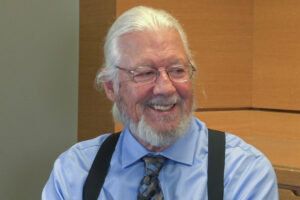
Interview of Leland (Lee) Rolfs, October 28, 2019
Interviewed by Rex Buchanan
In this oral history interview recorded in 2019, Lee Rolfs explains that few regulations governed water use when he began working at the Division of Water Resources of the State Board of Agriculture in 1978. He describes how the State responded to depletion of the Ogallala aquifer by creating Groundwater Management Districts (GMD) to manage future development, and to create a comprehensive system to address water issues. Rolfs recalls how the policy positions switched over time from the State being reluctant to regulate groundwater use when the GMDs initially sought restrictions to the opposite, with the GMDs opposing regulations Show Morewhen the State sought to impose them. He recalls his work on ground-breaking litigation with Colorado over water in the Arkansas River (Kansas v. Colorado). That case spanned over 25 years of his career with the State. Rolfs expounds on the Water Appropriation Act and its importance in the development of Kansas and its limitations in addressing the issue of long-term declines in the water table. He observes that cooperation, knowledge, and education are essential for properly managing water in Kansas. Show Less
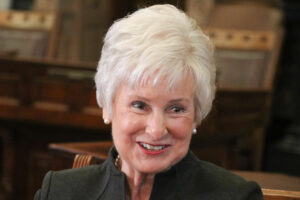
Interview of Alicia Salisbury, October 23, 2020
Interviewed by Patty Clark
Former Senator Alicia Salisbury grew up in a political family--both father and grandfather served in the legislature--so her sixteen years of service as a Kansas Senator continued the family tradition. She also was a serious legislator who believed in community service as witnessed by the numerous boards and committees on which she served, both volunteer and elected. Salisbury's driving interests were improving the economy of Kansas and bringing growth in wealth to her community and state. Salisbury's 2020 oral history interview chronicles her work ethic. With her children no longer at home, she had the Show Moretime and the interest to dive into a wide assortment of issues, from workforce development, to interstate banking, to telecommunication reform, to a blue ribbon panel on workers compensation. Salisbury worked long hours and focused on constituent services. She boldly asked for the committees that interested her and championed changes where necessary. Salisbury succeeded in changing the Labor and Industry Committee into the Commerce Committee to handle everything from economic development strategies to workers compensation. She tackled tough issues with a sense of humor and the skills of collaboration learned as a volunteer leader. This interview describes her determination, her commitment, and her legacy to the state of Kansas as Vice President of the Senate. Show Less

Triple Date – Conversation with Alicia Salisbury and Nancy Parrish, October 23, 2020
Interviewed by Joan Wagnon
In this short 2020 Statehouse Conversation two former Kansas State Senators, Nancy Parrish and Alicia Salisbury recall their first year serving in the Kansas Senate. In 1984 Shawnee County elected three women Senators: Nancy Parrish, a Democrat; Jeannie Hoferer, a Republican, and Alicia Salisbury, a Republican. Martin Hawver, a reporter for the Topeka Capitol Journal at that time, referred to them as a "Triple Date." Two of the three former senators discuss briefly what it was like in the Senate in 1985 when they took their seats and how they were treated by their male colleagues. Salisbury and Parrish saw Show Morewomen's issues as "people issues." Salisbury relates being removed from a conference committee on an education bill because she "did what's best for the schools she represented." Show Less
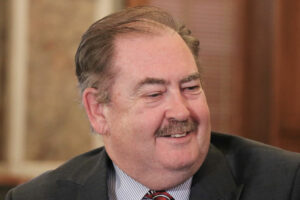
Interview of Tim Shallenburger, September 25, 2020
Interviewed by Alan Conroy
This interview with Tim Shallenburger, former Speaker and twelve-year House member is packed full of interesting anecdotes covering his philosophy of leadership, antics in the House, battles fought and won. Shallenburger was the first "conservative" Speaker following a wave of conservatives being elected beginning in the early 1990's. He candidly discusses why he ran for office in a largely Democratic district, how he moved up in the leadership and developed relationships with other legislative leaders in both House and Senate. Early in his time in the House, Shallenburger was part of a group known as the "rebels". Show More He watched other people's leadership styles and learned how to be a leader himself, first getting elected Speaker Pro Tem and then Speaker, beating Speaker Bob Miller in a "not-so-close" race. Shallenburger learned how to count votes. He doesn't see himself as having an "agenda", other than being fair as a leader. Shallenburger describes the rules changes the rebels made in the House when Jim Braden was Speaker to allow more bills to be heard or pulled out of committee. Bill Graves was Governor throughout all four years of Shallenburger' s term as Speaker. Shallenburger left the legislature to become State Treasurer. After 2010 he served as legislative liaison for Governor Brownback. Shallenburger talks openly about his relationships with numerous governors and senate leaders. The interview closes with a discussion of redistricting. Show Less
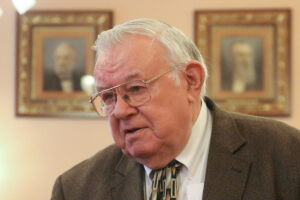
Interview of Ralph Skoog, July 17, 2015
Interviewed by Burdett Loomis
In his 2015 oral history interview, former Representative Ralph Skoog recalls a Kansas Legislature in transition. Ralph was initially elected to represent Topeka and Shawnee County in 1961, prior to the U.S. Supreme Court's Baker v. Carr 'one-person, one-vote' decision. His first 'district' was one-third of Shawnee County. When he returned to the House in 1967 after an unsuccessful campaign for Congress in 1964, he represented a more equal-size district of approximately 17, 000 residents of the County. Ralph recalls a legislature very much in transition at the beginning of the decline of rural domination of Show Morethe policymaking process and at the beginning of institutional change that came to fruition after the end of his last term. He recalls passage of important highway, prison, and school district consolidation legislation during his time of service in the House. Show Less
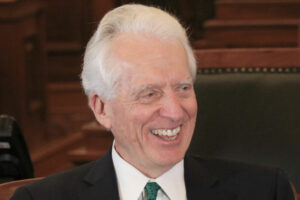
Interview of James (Jim) Slattery, March 6, 2020
Interviewed by Jim McLean
The 1970's marked major changes in state government. They are doing away with county welfare offices and creating the Department of Social and Rehabilitation Services (SRS) Concerns over lack of equalization started with Caldwell school finance case. Transportation is being centralized and modernized with the creation of the Department of Transportation (KDOT). Slattery even introduced legislation to decriminalize small amount of marijuana. Campaign finance reform (post-Watergate) and hiring non-partisan, professional staff for the legislature took hold. Slattery and another new freshman, Mike Hayden support legislation to clean up strip mines and reclaim mined Show Morelands. The first income tax reform was initiated despite the governor's veto. Community corrections is emerging as a good strategy. Slattery describes the role of abortion in civil discourse in this interview, how it started in the Dole/Roy race in 1974, and how it continues to distort the American political system in a significant way. He explains why he ran for Congress as a deficit hawk and talked about some of his Congressional experiences. The interview closes with a story about Tip O'Neil and another about former Speaker Clyde Hill who advised Slattery to be accurate when speaking at the Well of the House. Show Less
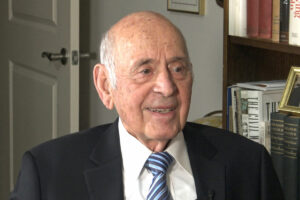
Interview of Bob Stephan, October 21, 2020
Interviewed by Michael (Mike) Matson
Former Attorney General Robert T. Stephan, in this 2020 oral history interview, recalls the highlights of his years serving the State of Kansas as Attorney General (1979 to 1995). Stephan's career as a champion of children as well as victims of crime and discrimination was shaped by his upbringing in Wichita and his strong sense of what it right. Stephan laments the increasingly partisan atmosphere of the National Association of Attorneys General, an organization to which he belonged during his time in state service.
